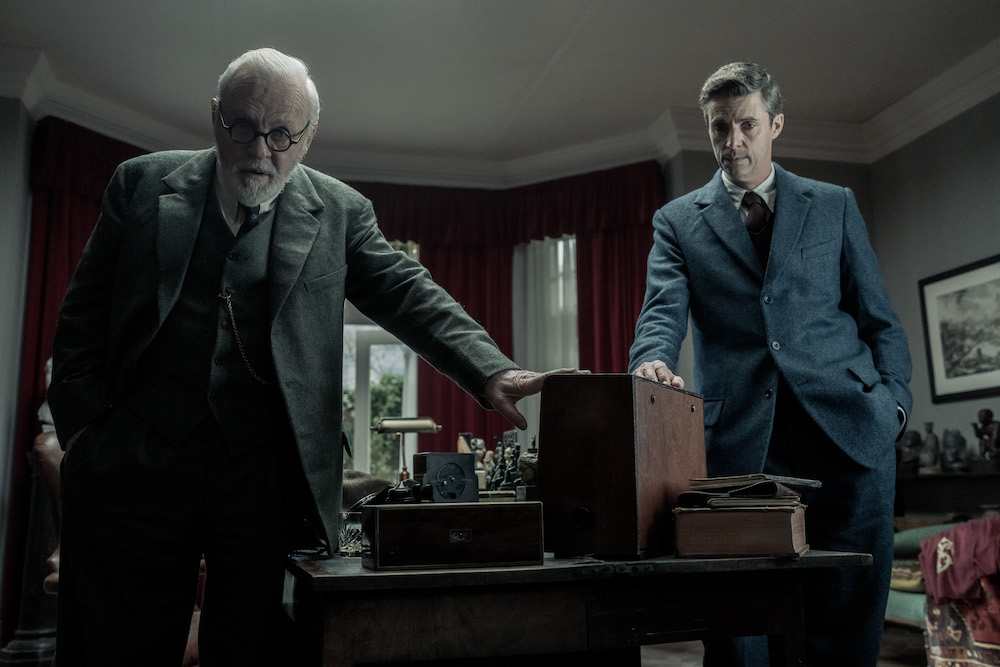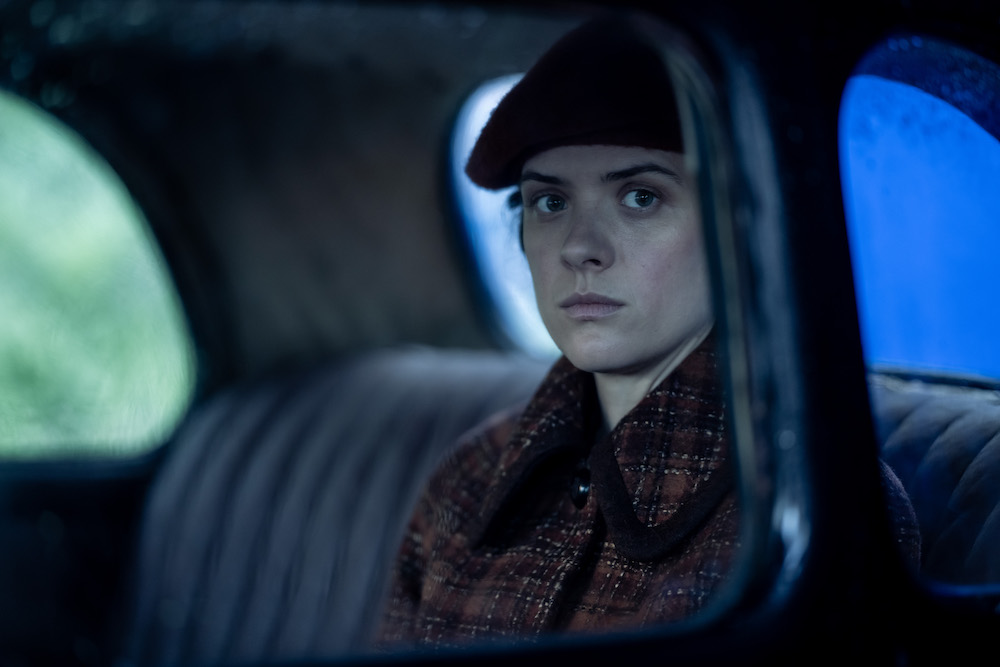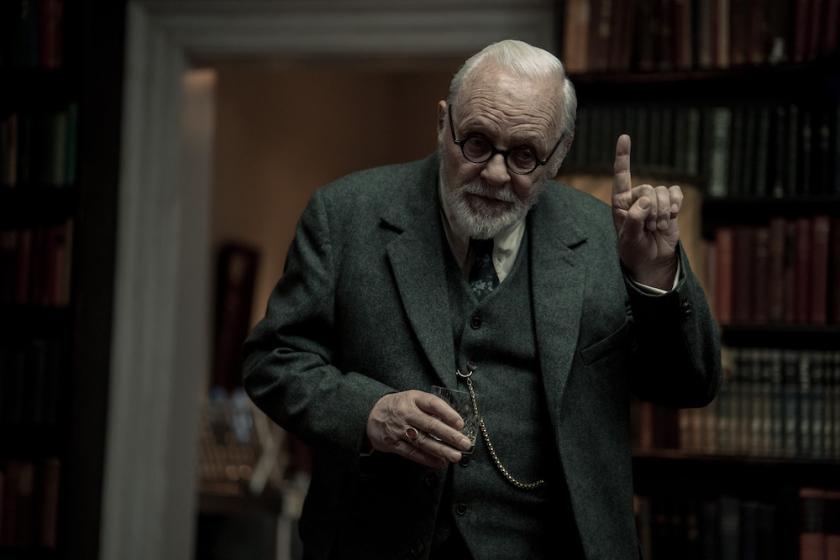How can it be part of God’s plan to allow so much pain and suffering in the world, asks Sigmund Freud (Anthony Hopkins) of a young Oxford don, CS Lewis (Matthew Goode). His daughter Sophie died of the Spanish flu, his grandson, aged only five, of TB, he tells Lewis furiously. To those who believe in religion, his advice is: “Grow up.”
“If pain is His megaphone, pleasure is His whisper,” says Lewis enigmatically. “Man’s suffering is the fault of man.” Freud takes another swig of whisky laced with morphine for the pain from his cancer of the jaw. In Nazism, he says, he recognised the face of the monster (his daughter Anna was taken and questioned by the Gestapo) and that monster, he adds, is our moral certainty.
Freud’s Last Session is directed by Matthew Brown and co-written with American playwright Mark St Germain, author of the 2009 stage play of the same name. Hopkins and Goode (pictured below) give excellent performances (interestingly, Hopkins played an older CS Lewis in Shadowlands in 1993) but there’s a faintly pointless and schematic air to the proceedings.
In real life the two men – one a Christian, the other an atheist – never met (though we’re told that an unknown don did visit Freud shortly before he died) but Brown and St Germain have them debating the existence of God on 3 September 1939, the day that Chamberlain announced that Britain was at war with Germany. Their long discussion is interspersed with bomb scares and Lewis’s memories of the horrors of the Battle of the Somme, as well as his intimate relationship with a fallen comrade’s mother. The film is set mainly in Freud’s study, impressively reconstructed by production designer Luciana Arrighi, at 20 Maresfield Gardens in Hampstead (now the Freud museum) where he lived with his family, including Anna (a charming Liv Lisa Fries; Babylon Berlin; pictured below) after fleeing the Nazis from Vienna in June 1938. He was only there for a year before he died.
The film is set mainly in Freud’s study, impressively reconstructed by production designer Luciana Arrighi, at 20 Maresfield Gardens in Hampstead (now the Freud museum) where he lived with his family, including Anna (a charming Liv Lisa Fries; Babylon Berlin; pictured below) after fleeing the Nazis from Vienna in June 1938. He was only there for a year before he died.
Watching a special screening of the film there (set designs and props such as copies of the couch and his ergonomic desk chair from the film are also on display) had a bit of an added frisson for me because my father was one of the first translators of Freud (Future of a Illusion, in 1929), and was psychoanalysed by, among others, Ernest Jones, Freud’s biographer and acolyte, played by Jeremy Northam in the film, and by Anna Freud. Perhaps he lay on her couch in this very house, where she lived and practised until her death in 1982. Not that he would have mentioned it to me (I did donate my outgrown tricycle to her children’s clinic, though).
The relationship between Anna and her father is problematic, to say the least, and it makes for much needed dramatic tension. She’s in a relationship with Dorothy Burlingham (Jodi Balfour; Ted Lasso), a stylish American child psychoanalyst and heir to the Tiffany fortune who founded a war nursery with Anna and was in analysis with Freud in Vienna. As was Anna. Such a good plan, having your dad as your analyst. But Freud is unable to countenance his daughter being a lesbian. No, stop it, you’re not a boy, he tells her as, in flashbacks, she lies on his couch, recounting sado-masochistic fantasies. “Please help me,” she begs, but dad is having none of that nonsense. He’s also not keen on Jones’s attempts to court her. In fact, he comes over as selfish, narrow-minded and controlling. Not sure what my father would make of that.
But Freud is unable to countenance his daughter being a lesbian. No, stop it, you’re not a boy, he tells her as, in flashbacks, she lies on his couch, recounting sado-masochistic fantasies. “Please help me,” she begs, but dad is having none of that nonsense. He’s also not keen on Jones’s attempts to court her. In fact, he comes over as selfish, narrow-minded and controlling. Not sure what my father would make of that.
In spite of this, Anna is completely devoted to her father and breaks off lecturing to a group of male students to go to the chemist to get his morphine. His wife, Martha, is not in evidence. “She’s away,” he tells Lewis, who’s wondering why Freud insists that Anna, rather than his doctors, help him with his mouth prosthesis. His dog, poignantly, can’t stand the stench of death, as Freud puts it, and runs away from him.
Intimations of the Narnia chronicles occur in the form of Lewis wandering in a dark wood and seeing a fawn, illuminated by an unearthly light. His first experience of joy, he tells Freud, was when his brother gave him a forest in a biscuit tin. Ah yes, Sehnsucht, or longing, comments Freud, sucking on his cigar.
Among his Egyptian artefacts, Freud has a statue of St Dymphna, patron saint of the mentally ill and the lost. So a nod to God, after all? At the end, after a grisly scene where Lewis is forced to get to grips with the prosthetic, the men take leave of each other. The impending war hangs over everything. “Auf wiedersehen,” says Freud. “Goodbye,” says Lewis, more realistically. Freud died by assisted suicide three weeks later.















Add comment